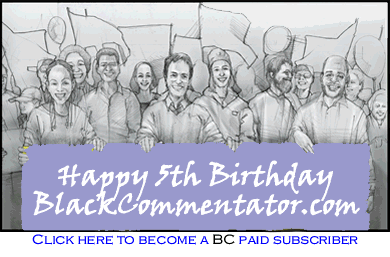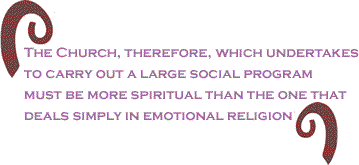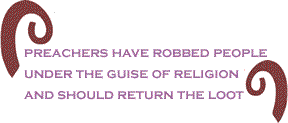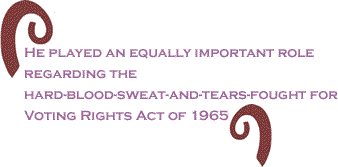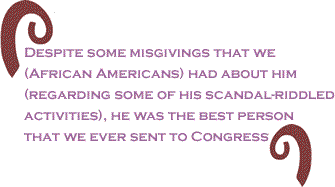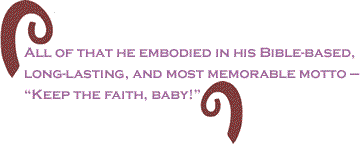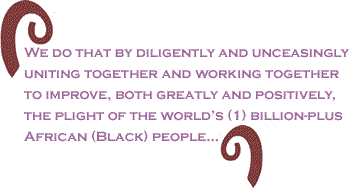
|
|||||||||||||||||||||
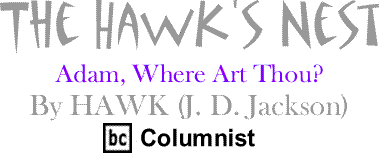 |
|
Echoing down the hallowed halls of a huge, Harlem home came the cry: “Adam where art thou?” Interestingly enough, both the crier and the person whom he sought, shared both the same home and the same name — Adam Clayton Powell. The first was none other than the father, and the latter was none other than his son. Together, they formed a powerful, dynamic duo that has left an indelible mark on the world. Caucasian-looking enough to pass easily for white, they both, in succession, would lead what was once one of the largest churches in the United States — Abyssinian Baptist Church in Harlem, New York, “the Black capital of the world”. Internationally-known as respective pastors of that historic, Ethiopian-established, block-long church, both Adam, Sr. and Adam, Jr. envisioned Abyssinian as more than a church made of brick and mortar. In their collective mind, its overall God-ordained purpose was to meet the needs of its parishioners and the suffering, surrounding community. Adam, Sr. firmly and repeatedly expressed the major philosophical foundation of such thinking in both spoken and written word. He succinctly did the latter in a must-read essay that he composed in January, 1923 for the National Urban League magazine Opportunity. Entitled “The Church in Social Work,” that essay clearly renders Adam, Sr.’s view on the role of the Christian Church, most especially the historic Black Church. After first stating that “Christianity is more than preaching, praying, singing, and giving; it is all of these but a great deal more,” Adam, Sr., in his essay, states that “The purpose of the Christianity of Jesus as revealed in the New Testament is to supply man’s social as well as spiritual needs.” In short, he writes, “The church is being called upon to give the world a Christianity of deeds as well as a Christianity of creeds.” The highly-esteemed, Black clergyman further defended his point of view by writing that the Church that “relates itself to every problem of the masses” will be better able to “grip and hold men in the future.” Attempting to ward off any and all potential naysayers, he goes on to assert that doing so “does not mean that emphasis will be shifted from man’s spiritual to his social needs”. Instead, as he puts it, doing so will emphatically carry out what he describes as “the paramount duty of the Church” — “to Christianize the social order”. He more forcefully drives his key point home with these words: “The Church, therefore, which undertakes to carry out a large social program must be more spiritual than the one that deals simply in emotional religion”. Years later, Adam, Jr. would express the same sentiments in these words: “…([the] Negro Church) has the potentiality of being the greatest force in our race….Let us stop commercializing the church and make the church an instrument, keen and rugged, fighting exploitation and raising the standards of our race along the entire battlefront of human liberties. Upon this basis only,” he concluded, "does the church deserve to survive”. Speaking at another time, he uttered these words, “[all too many]…preachers have robbed people under the guise of religion and should return the loot”. And speaking to the dire need for and challenge to the Church, both then and now, to meet the socio-economic and educational and spiritual and healthcare needs, among other things, of the suffering and the oppressed, especially in the Black community, he said, “If the churches do not answer their challenge, they ought to shut up and close up”. Are those words still relevant today?
Many would argue that they are. Others would counter with “Well, just what did Adam, Sr. and Adam, Jr. do? Did they just talk the talk or did they walk the walk?” History, which Adam, Jr. described as “the final judge of all mankind”, honestly answers with the four-letter word “both”. They did both and continued to do so throughout their lifetimes. During the economically devastating Great Depression of the 1930s that resulted in widespread unemployment and despair, homelessness and hunger throughout the United States and the world, Adam, Sr. and Jr. doggedly made every effort have their church, Abyssinian, served as a stalwart, beacon of hope for one and all. As such, it fed the hungry, clothed the naked, and provided much-need job training to the jobless. It even supplied day care facilities for needy parents and guardians. These humanitarian, yes, godly, deeds, among others, turned the father’s and son’s words into flesh, which still dwell among us. And the son, a “Triple P” (preacher, playboy, and politician), would carry and spread those words and deeds wherever he would go. He did so in New York City as a steel-backboned, fearless, and unyielding civil, labor, and human rights protest leader and negotiator even before many of his protégées (the late Rev. Dr. Martin Luther King, Jr. and Malcolm X, the Rev.s Jesse Jackson and Al Sharpton, among others) were born, even leading a major bus boycott in New York in the 1940s that preceded by fifteen years and, greatly, says Powell, inspired the famous Montgomery Bus Boycott of 1955. Adam, Jr. carried and spread those humanitarian, yes, godly, deeds into politics — firstly as the first African American to ever be elected to the New York City Council and, secondly, as the forth African American to serve in the United States Congress since 1901 and the first African American to be elected to Congress from the eastern seaboard since Reconstruction.
Blessed with Hollywood good-looks (resembling a more handsome version of a young macabre actor Vincent Price) and a brilliant mind, nerves of steel and unmatched oratorical and debating skills, and oozing from every pore of his being with boundless charisma, the thin-mustachioed, U. S. Congressman Adam Clayton Powell, Jr. struck an eye-catching, awesome pose that could easily have inspired many of those same, enviable traits that found a home in the fictional character James Bond, which was created and popularized during Powell’s twenty-plus year stint in congress. Powell “struck” just such a pose as he made long, meaningful strides up and down the halls of Congress, throughout the United States, and around the world while identifying, investigating, and even righting social wrongs that came under his hawkish gaze. He even found himself caught up in some of those wrongs himself, his enemies often gleefully and loudly roared. Yet Powell’s words and deeds for justice roared louder. Often, he did so silently, as a well-dressed, suave and debonair, long-time militant, who audaciously called himself “the first bad nigger in congress.” At other times, his roar was much louder as he shattered stereotypical images of meek Black men by snail-driving his powder-blue Jaguar up and down the streets of Washington, D. C. or by single-handedly desegregating the “whites only” congressional facilities there (such as the dining area, the barber shop, and the press corps) by steel-nerved audacity. He did that and other things with and without his stylish, Black shades on and/or before, during, and after taking a deep drag on one of the chocolate-colored cigarillos that frequently found itself held firmly in one of his hands. He did so while strongly urging the U. S. Congress to more greatly recognize and financially and politically support the rightful existence of African and Latin American/Caribbean countries, such West Africa’s Ghana and the Ivory Coast (two of the world’s largest producers of chocolate) and such Caribbean islands as Cuba, Jamaica, and Puerto Rico, the homeland of Powell’s third and last wife. More importantly, perhaps, Adam Clayton Powell, Jr.’s “voice”, in words and deeds, roared the loudest and continues to do so because of the numerous pieces of social legislation that became law under his leadership of a congressional committee that then controlled nearly 50% or more of America’s domestic budget — the House Committee on Education and Labor. Highly heralded for his congressional leadership by, as he put it, “his friend” President John F. Kennedy, Powell was equally praised by none other than Kennedy’s successor, President Lyndon Baines Johnson, for his exemplary chairmanship of that committee. Such praise seems well-deserved, considering the fact that Powell, as chairman of the House Committee on Education and Labor, was primarily responsible for the successful passage of such socially-significant, congressional legislation that benefits all American citizens, both old and new, such as Headstart and the Upward Bound program, Job Corps and the school lunch program, equal pay for equal work for men and women, federal manpower training and higher minimum wages, vocational rehabilitation and educational and training films for the deaf, student loans for college and university students, and the National Endowment for the Arts and the National Endowment for the Humanities, which, reportedly, temporarily and doggedly denied funding at one time for a documentary focused on Powell because they did not consider him to be a “sufficiently important” historical figure. Much to their chagrin, it is said, someone had to remind the National Endowments that the very person who they dubbed as “a not sufficiently important historical figure”, Adam Clayton Powell, Jr. himself, both wrote and sponsored the legislation that established them. But Powell did not stop there. He further played a pivotal role in the passage of the Civil Rights Act of 1964, which gave birth to the government agency which fights against age-, race, gender-, and physical disability-oriented, job discrimination — the U. S. Equal Employment Opportunity Commission (EEOC). He played an equally important role regarding the hard-blood-sweat-and-tears-fought for Voting Rights Act of 1965. He also spoke out boldly against war, namely the one in Vietnam.
As a congressperson, Powell was also a crime fighter. Fearlessly and with little regard for his own personal well-being, on the floor of congress, he gave the names and addresses of prominent Mafia crime members and numbers running and other illegal businesses that wrecked havoc in his beloved Harlem and to his constituency and who the police department regularly overlooked while busting up and hauling to jail less profitable, Black-run criminal operations. By so doing, he forever purposefully had such information permanently logged into U. S. congressional records. Threatened by the mob, Powell did not stop his all-out assault on what he identified as corruption. Besides Southern and Northern white supremacists, legal and illegal anti-Black practices in virtually every facet of American life, and the financially and politically powerful Mafia, he courageously struck blows against seemingly brazen police brutality and corruption by speaking out against and investigating both as they pertained to the nation’s largest police department — the New York City Police Department. He did so years before the famous, former New York City policeman Frank Serpico (portrayed by Italian actor Al Pacino in the much-heralded movie about New York City Police corruption called “Serpico”) surfaced with headline-grabbing news that more widely exposed the world to both. Called “the Prince of Harlem”, “Mr. Civil Rights”, and “Mr. Jesus”, Adam Clayton Powell, Jr. was certainly one of the greatest, modern models of a living man who lived life to the fullest and loved boundlessly, not only wine, women, and song and globetrotting, but also hard, but necessary, and often thankless work. That, of course, makes him neither a complete sinner nor a total saint. But, like most people whose entire lives brim over with heart-felt and carried-out convictions, he was both — a “stinner”. In short, it makes him a man, who, in his words, “[is] made in the image of God.”
Not perfect by any means, but who is, Powell was described by the famed African American journalist Gil Noble, who interviewed him shortly before his death, as someone who “worked just as hard as he played.” The late, long-time, Harlem resident, world-famous Black historian, and Powell supporter, Dr. John Henrik Clarke, said this about Powell,: “He bathed in Blackness.... [I’m Black.] That’s what I am.” Clarke also said, “Despite some misgivings that we [African Americans] had about him [regarding some of his scandal-riddled activities], he was the best person that we ever sent to Congress. He got the job done”. Wil Haygood, Powell’s award-winning biographer, described Powell “as a man who lived high but who could still ‘get down on his knees and walk with people who had nothing’”. As such, while often grappling with his own daily trials and tribulations, Adam Clayton Powell, Jr. always managed to encourage the downtrodden to life their heads up, their backs straight, their minds clear, and their strides stretching forward. Stressing the importance of maintaining a positive outlook even in the worse of circumstances, he led by example as he continued to fight, tooth and nail, for positive social change around the world. All of that he embodied in his Bible-based, long-lasting, and most memorable motto — “Keep the faith, baby!” And truly that is what the entire (1) billion-plus member, globally-dispersed African (Black) World Family (AWF) must do. Yes, it must “keep the faith, baby” as it decisively casts aside the petty socio-economic, geo-political, and religio-educational and skin pigment and hair texture differences, among other things, that divide them. Yes, it must “keep the faith, baby” as it fights daily and desperately to emphasize and unify around its profound similarities, namely that its people are — genetically, historically, and racially and culturally — one people (Black people, African people) from one land (Africa, their ancestral homeland and that of all humanity and human civilization and the world’s richest continent) fighting against one enemy (white, yellow, brown, red and/or any other kind of anti-Black/African supremacist individual, group, and/or ideology) who historically have used and abused, enslaved and slaughtered, lived with and lied about, defamed and destroyed African people, (solely to enrich their own culture and coffers) who strive for one purpose (freedom).
Yes, the African World Family must “keep the faith, baby” as it fights vigorously for freedom from heart-wrenching hunger and homelessness, freedom from false imprisonment and undeserved suffering, freedom from mind-crippling education (miseducation) and soul-deforming, do-nothing religions. It must "keep the faith, baby" as it strives for freedom from falsehoods and infinite injustice in all its myriad forms, freedom from self-hatred and self-pity, and freedom from energy-zapping, self-doubting attitudes that prevent us from fully realizing, as Dr. John Henrik Clarke often said, “We [African people worldwide] are the ones we have always been looking for”. In short, outside of God, if you will, like it or not, believe it or not, we are our only, true salvation. It is not in the best interests of anyone or any group — well-known, little-known, or virtually unknown or young or old — to do for us what we can and must do for ourselves. And just what is that? That is to save ourselves — body, soul, and mind. And just how do we do that? We do that by diligently and unceasingly uniting together and working together to improve, both greatly and positively, the plight of the world’s (1) billion-plus African (Black) people, our people, in all nine areas of what the noted African American psychiatrist, Dr. Frances Cress Welsing, calls “people activity” — economics and education, entertainment and labor, law and politics, religion and sex, and war.
Most importantly, ever-tightening our grip on those people, places, things and ideas that unite us and loosening that grip on the same that divide us, members of the African World Family, we can make long-lasting, meaningful strides by adhering to the 1960’s, Black Revolution adage of “unity without conformity.” In short, we can have our disagreements but never, as Malcolm X said, in public before our enemies, but behind closed doors among ourselves. But never, under any circumstances, should we allow our minor differences to overshadow our major similarities — that we are African people and, collectively, represent a hugely, significant physical and financial, mental and mineral, educational and political, historical and cultural, philosophical and spiritual force in this world, both past and present. Let us all seriously think and act on those thoughts as we simultaneously, in the words of Powell, “Keep the faith, baby!”
Adam Clayton Powell, Jr. kept the faith until his death on April 4, 1972. That was over seven years after the assassination of his protégée Malcolm X and fours years, to the day, after the assassination of his protégée Rev. Dr. Martin Luther King, Jr. Brothers and Sisters, now let us praise and follow in the footsteps of such self-sacrificing, other-centered men and women. For the next time we “hear” someone say, “Adam [Sr. and Jr., sharing and caring, brave and bold, yes, Adam Clayton Powell, Jr. and other men and women of good will, who sacrificed both their time and talents to improve conditions for African (Black) people the world over, since time immemorial] where art thou?”, we should all point to our hearts, our souls, and our minds, to our words and to our works, and say, “In here and,” waving our hand over our world, “out there.” BC Columnist HAWK (J. D. Jackson) is a priest, poet, journalist, historian, and African-centered lecturer and a middle school teacher and part-time university history instructor. Click here to contact HAWK. |
|
| Home | |
| April
12, 2007 Issue 225 |
||||||||||||||
|
||||||||||||||
| Printer Friendly Version in resizeable plain text format | ||||||||||||||
 |
||||||||||||||
|
||||||||||||||
 |
||||||||||||||
 |
||||||||||||||
 |
||||||||||||||
| |
||||||||||||||
| |
||||||||||||||





















